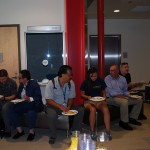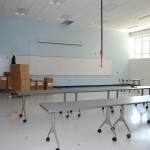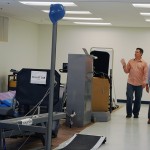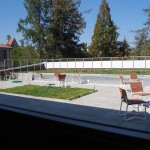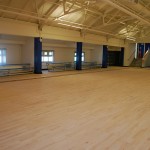True to San José State University’s (SJSU) reputation as the best place in Silicon Valley to learn how to prosper in the 21st century economy, SJSU’s School of Journalism and Mass Communications (JMC) faculty and student staff members from SHiFT Magazine and South Bay Pulse are pushing the limits of digital technology. Like so many successful Silicon Valley start-ups, seed money came from experienced players and visionaries. Early contributors to the magazine program included SJSU’s Lucas College of Business and Hewlett-Packard (HP) Labs in Palo Alto, California.
“HP Labs helped us overcome the cost and distribution challenges,” says SJSU professor Tom Ulrich, magazine sequence advisor and digital publication program manager. “Our beautifully rendered magazines are available to a worldwide audience via HP’s print-on-demand service for about fifteen cents per page.”

Journalism students create new digital magazine “The South Bay Pulse” to cover 25th Annual Cinequest Film Festival (photo: Christina Olivas)
With cost of printing and world-wide distribution in hand, Ulrich and engineers at Adobe Systems agreed to explore the most sophisticated tools for producing groundbreaking print and digital publications.
Last February, the staff produced the red carpet event at Cinequest. Staff members streamed the event live to subscribers across the world with Adobe software and $6,000 worth of off-the-shelf electronic equipment. They replaced the million dollar transmission trucks parked in front of the California Theater with portable electronic gear that every department on campus can afford.
“While still in its infancy,” Ulrich says, “we are convinced that these digital tools allow our students to rewrite the rules of broadcast journalism.”
As part of our ongoing experiment, the journalism program added South Bay Pulse, a digital weekly entertainment guide, to its stable of publications. In the summer of 2015 as part of the Adobe Challenge, staff members tested the December 2015 release of Adobe’s Digital Publishing Suite (DPS) software.
“With SHiFT magazine and South Bay Pulse, we are performing primary research in the undergraduate classroom,” says Ulrich. “In addition to contributing our ideas to Adobe’s next product release, we are the only group on campus to own an Apple developer’s ID.”
While Adobe created DPS in 2010 to clear the path for a prominent magazine publisher to move from print to the digital world, students from JMC are now helping to move the new industry standard forward.
“Staff members were chosen over students from other Bay Area universities to join seasoned programmers at Adobe to help develop the next generation of digital publication software,” Ulrich says. “Our students graduate not just knowing how to use these visionary tools. They are prepared to lead the industry.”




